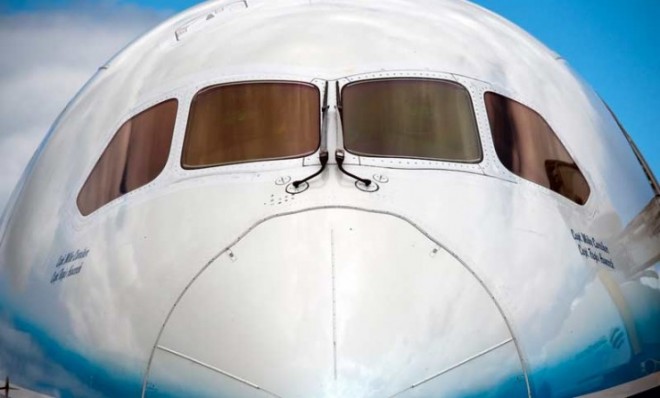Grounded: How Boeing's 787 Dreamliner is becoming a nightmare
Regulators around the world have ordered a halt to Dreamliner flights over safety concerns


A free daily email with the biggest news stories of the day – and the best features from TheWeek.com
You are now subscribed
Your newsletter sign-up was successful
It just keeps getting worse for Boeing's 787 Dreamliner. After a week of mounting problems, regulators around the world, including the U.S. Federal Aviation Administration, have grounded the aircraft over safety concerns. In particular, inspectors are scrutinizing the Dreamliner's lithium-ion battery, a cutting-edge piece of equipment meant to reduce fuel costs.
There are currently 50 Dreamliners in use, six of which are operated by United Airlines. Nearly half the world's Dreamliners are owned by Japan Airlines and All Nippon Airways, which was forced to emergency-land a Dreamliner this week after the battery malfunctioned. It remains unclear what happened to the battery, though it was reportedly a blackened mess when it was removed from the aircraft. Other countries that agreed to ground the aircraft include Poland, India, Chile, and Qatar.
Boeing executives maintain that the Dreamliner is safe. "We are confident that the 787 is safe and we stand behind its overall integrity," said CEO Jim McNerney.
The Week
Escape your echo chamber. Get the facts behind the news, plus analysis from multiple perspectives.

Sign up for The Week's Free Newsletters
From our morning news briefing to a weekly Good News Newsletter, get the best of The Week delivered directly to your inbox.
From our morning news briefing to a weekly Good News Newsletter, get the best of The Week delivered directly to your inbox.
Still, the worldwide grounding of a new aircraft has few precedents. Industry analyst Scott Hamilton tells Reuters that a grounding "is about the worst thing that can happen to an airplane program." And if the Dreamliner's lithium-ion batteries are defective, it could lead to some scary scenarios. According to The New York Times:
[Boeing chief engineer Mike Sinnett] said that if the lithium-ion batteries started a fire, it would be nearly impossible to put out because the batteries produce oxygen when burning. Mr. Sinnett said that the plane was designed to survive such an event in flight, when the cabin’s air-pressure system protects passengers and allows the plane to vent the smoke outside. The plane is also designed, he said, to contain a fire to a small area.
"Fire suppressants just won’t work on a situation like that," he said in the conference call. "So something like that is very difficult to put out." [New York Times]
If the batteries need to be replaced, it would cause Boeing innumerable headaches. Reverting to nickel-cadmium or lead-acid batteries would make the planes heavier, less fuel-efficient, and potentially less attractive to airlines. It would also lead to a cascade of delays on new orders, which need to come through for Boeing to realize a profit on its costly investment. Indeed, Boeing had hoped to begin pumping out 10 Dreamliners a month, a plan that is now on the backburner.
So far, no airline has canceled its orders, and analysts continue to say that such an event is unlikely. However, Poland's state-controlled LOT Airlines said it would only accept its upcoming delivery of three Dreamliners if all the aircraft's technical issues are resolved.
And of course, there is the question of consumer confidence. "If I was going to fly on a Dreamliner for this trip, I would cancel it and re-book on another flight using 'proven winner' airplanes that have a good safety record," one frequent traveler tells USA Today. Boeing really needs to put questions of safety to rest before sentiments like that grow.
A free daily email with the biggest news stories of the day – and the best features from TheWeek.com
Ryu Spaeth is deputy editor at TheWeek.com. Follow him on Twitter.
-
 Crisis in Cuba: a ‘golden opportunity’ for Washington?
Crisis in Cuba: a ‘golden opportunity’ for Washington?Talking Point The Trump administration is applying the pressure, and with Latin America swinging to the right, Havana is becoming more ‘politically isolated’
-
 5 thoroughly redacted cartoons about Pam Bondi protecting predators
5 thoroughly redacted cartoons about Pam Bondi protecting predatorsCartoons Artists take on the real victim, types of protection, and more
-
 Palestine Action and the trouble with defining terrorism
Palestine Action and the trouble with defining terrorismIn the Spotlight The issues with proscribing the group ‘became apparent as soon as the police began putting it into practice’